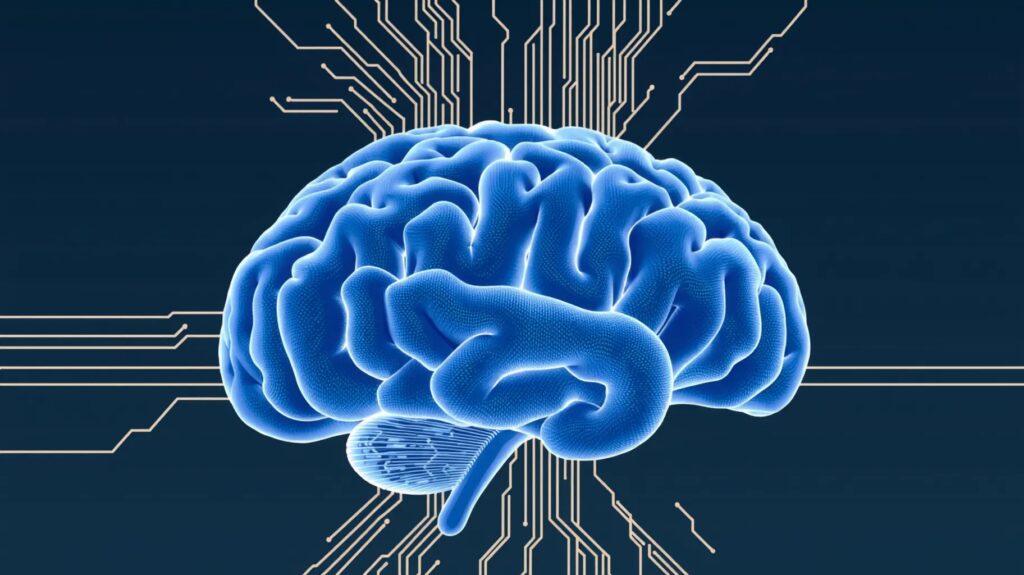
With invasive brain-computer interfaces (BCIs) becoming a reality, the connection between brains and machines is more direct than ever.
As intriguing as this is, the concept of BCIs opens a vast set of risks—including the risk of your brain being hacked. Let’s dive into what’s at stake when this powerful technology faces the vulnerabilities of cyberattacks.
What Are Invasive Brain-Computer Interfaces?
How Invasive BCIs Work
Unlike non-invasive BCIs, which sit outside the skull, invasive BCIs involve implanting devices directly into the brain. These systems, designed to read, interpret, and even manipulate brain signals, aim to help those with neurological disorders, paralysis, or sensory impairments. By tapping into neural circuits directly, these interfaces have the potential to enhance memory, restore movement, and even provide “superhuman” abilities.
Current Applications and Future Potential
Today, invasive BCIs are still in the experimental phase, primarily used in medical trials and research for conditions like epilepsy, Parkinson’s disease, and severe spinal cord injuries. But the future could be more complex: invasive BCIs may one day allow people to control computers, robotic limbs, or even communicate telepathically. With more adoption, however, comes a greater risk.
A Unique Security Challenge
Invasive BCIs face cybersecurity threats unlike those of regular digital devices. Breaches could go beyond data theft to direct manipulation of thoughts, emotions, or physical actions. With an interface so closely linked to who we are, the security of BCIs is paramount—and the potential consequences, profound.
How Could Your Brain Get Hacked?

The Mechanics of Brain Hacking
As BCIs advance, they could become accessible over networks or cloud-based systems for updates or remote monitoring. Like any connected device, BCIs could be susceptible to malware, unauthorized access, and data interception. If hackers breach these devices, they could theoretically manipulate neural signals, alter thoughts, or even cause involuntary physical reactions.
Real-World Hacking Threats
While it may sound like science fiction, the foundations of such threats already exist. In 2020, cybersecurity researchers demonstrated vulnerabilities in implanted medical devices like pacemakers, warning of potential hacks. For BCIs, the stakes are even higher: hackers could compromise not just health, but identity and autonomy.
Risks of Brain Data Theft
BCIs collect vast amounts of neurological data—personal, behavioral, and even subconscious. If a hacker gains access to this data, it opens doors to privacy invasion and identity theft on an unprecedented level. They could potentially access and misuse a person’s thoughts, memories, or emotional patterns. The concept of “stealing thoughts” may seem far-fetched, but neurological data misuse could lead to coercion or psychological harm.
Manipulating Thoughts: Is Mind Control Possible?
The Reality of Thought Manipulation
With current technology, direct mind control remains highly speculative, yet the risk exists, especially if BCIs develop further. Today’s BCIs can influence specific brain regions to reduce pain or restore movement. Future advancements, however, could expand control over a wider range of cognitive functions, potentially allowing third parties to alter thoughts or behaviors.
The Ethics of Neural Manipulation
The potential to influence thoughts raises ethical concerns. Should someone else have access to your mind, even if it’s in a medical or supportive capacity? The idea of an external entity shaping your thoughts or influencing decisions crosses into new territory in medical ethics and personal privacy. Laws governing the ethics of BCIs are limited, leaving a regulatory gap that exposes users to abuse.
The Psychological Impact of Hacked BCIs
Imagine knowing that your thoughts, memories, or actions could be manipulated. The psychological toll could be immense, leading to chronic stress, distrust, and even paranoia. The prospect of hacked BCIs doesn’t just affect physical autonomy; it could also lead to mental health challenges and fundamentally disrupt an individual’s sense of self.
Loss of Privacy: How Safe Is Your Neural Data?
The Sensitive Nature of Neural Data
Neural data is among the most personal data imaginable. It includes raw information about your thoughts, emotions, reactions, and even potential subconscious biases. Unlike other forms of data, which can be reset or reconfigured, neural data ties directly to identity and experience. If compromised, it could lead to violations of privacy on a deeply personal level—revealing secrets, fears, or patterns you may not even be aware of.
Selling and Misusing Brain Data
One of the primary concerns is the potential commercial misuse of neural data. Imagine a future where companies buy and sell data directly from your brain for profit. Insights into your desires, stressors, and motivations could become a goldmine for advertisers. For example, brands could use your brain data to predict how you might respond to certain products, or even manipulate your preferences.
With tech companies already tracking so much of our digital activity, having access to neural data would take targeted advertising to an invasive extreme. Ethical questions arise: Should companies be allowed to profit from such sensitive information?
Limited Regulatory Protections
Privacy laws surrounding neural data are currently sparse, lagging behind the rapid pace of BCI development. Most data protection laws, like GDPR in Europe, weren’t crafted with neural interfaces in mind, creating significant gaps in protection. Without strict regulations, companies or third parties could potentially use, store, or sell your brain data without clear guidelines or accountability, further risking privacy.
Physical Security Risks: Beyond Mental Manipulation

Unauthorized Control of Motor Functions
In addition to reading neural data, many BCIs also work on sending signals to the brain or body. If hackers gain control of a BCI that interfaces with motor functions, they could potentially control movements or actions against your will. While still a remote possibility, it underscores how dangerous BCI breaches could be to physical safety.
Imagine having a BCI for medical purposes, like controlling limb movement, and then losing control over that function in a hack. Such scenarios, while speculative, could lead to life-threatening situations if hackers gain remote access to devices that can influence physical actions or responses.
Health Hazards of Malicious BCI Attacks
A hacked BCI could cause physical harm by disrupting neural signals related to vital body functions, including heart rate or breathing patterns. Cyber attackers could also induce psychological effects, like nausea, dizziness, or emotional disturbances, by manipulating specific neural regions. The mere possibility of someone compromising a BCI to impact health or well-being is enough to raise alarms about the need for robust cybersecurity measures in BCI design.
Lack of Control Over Medical Devices
For many BCI users, the devices are critical for day-to-day life and health. In a breach, people might be unable to access essential functions for medical conditions, such as pain management or motor control for paralysis. Worse still, they could be locked out or, in extreme cases, held “hostage” by hackers threatening their access. The lack of physical control could extend beyond the mental to disrupt everyday life in very real, physical terms.
The Legal Landscape: Uncharted Territory for Brain Rights
Brain Privacy and Ownership
As BCIs evolve, so do questions about brain privacy and data ownership. Who truly owns the neural data produced by these devices—the user, the device manufacturer, or the platform managing the data? Brain privacy laws are still in their infancy, and there’s little legal precedent for issues like BCI data ownership, making the future uncertain. Lawmakers, experts, and citizens alike are calling for new “neuro-rights” to protect against potential exploitation or misuse of neural information.
Liability in Case of Hacks
If your BCI gets hacked, who’s responsible for damages? Current laws don’t provide clear answers. Is the manufacturer liable for not securing the device? Or does the responsibility fall on the medical facility that installed it? These are tough questions with no concrete answers, as legal protections surrounding BCIs are still in development. Users face a legal gray area, especially when it comes to compensation for personal or emotional damages.
Ethical Implications of Neural Rights
The introduction of BCIs could lead to a reevaluation of human rights as we know them. Many experts suggest new “neuro-rights”, which would cover mental privacy, freedom of thought, and the right to avoid involuntary manipulation. While some countries, like Chile, have already started exploring legislation around these neuro-rights, it remains a largely uncharted territory. As more people adopt BCIs, the push for brain-specific protections will only grow.
Cybersecurity Solutions: How Can BCIs Be Protected?

Strengthening BCI Security Protocols
Developing effective cybersecurity protocols for BCIs is a critical step toward preventing brain hacks. Just as computers and smartphones come with encryption and security patches, BCIs must also have robust encryption standards to protect neural data. This could include multi-layered security systems with real-time monitoring for suspicious activity and AI-driven threat detection. Enhanced encryption would ensure that even if data is intercepted, it cannot be read or manipulated by unauthorized entities.
Regular Software Updates and Patches
Like any other device connected to the internet, BCIs must have regular software updates and security patches to protect against new vulnerabilities. However, this presents a unique challenge for BCIs, as updating software in an implanted device requires careful planning to avoid disrupting neural functions. Developers and manufacturers will need to prioritize secure update mechanisms that allow for rapid patching while ensuring user safety.
One possible approach could be to adopt “over-the-air” updates, allowing professionals to update BCIs without invasive surgery. However, this also means that update mechanisms need additional security to prevent unauthorized access during the process.
Developing Hacker-Proof Hardware
BCIs require not only secure software but also tamper-resistant hardware. Physical security measures, like anti-tamper circuits and secure boot systems, could protect BCIs against physical manipulation. Hardware encryption, combined with software safeguards, could add a further layer of security, making it harder for hackers to breach BCIs.
In the long run, using hardware-based encryption may be essential in thwarting potential hacks. The integration of self-destruct features or tamper alerts could serve as additional defenses, rendering the device useless if tampered with or breached, though these measures bring their own risks and complexities.
Ethical and Social Concerns: Are BCIs Worth the Risks?
Mental Privacy: A Basic Human Right?
Mental privacy is increasingly seen as a fundamental human right in the age of BCIs. With potential access to brain data, companies and governments may gain unprecedented insights into individuals’ personal lives, possibly infringing on thoughts or emotions previously considered private. As BCI technology advances, establishing laws to protect mental privacy becomes crucial, ensuring that no third party can intrude on thoughts or manipulate emotions without consent.
Some experts believe that the right to mental privacy should be protected under international human rights laws. Without such protections, invasive BCIs could lead to a future where thoughts are no longer sacred, creating a society of constant surveillance and control.
Psychological Risks of Adoption
The psychological effects of living with an invasive BCI could be profound. The knowledge that your brain activity is connected to a device may cause anxiety, paranoia, or even a sense of vulnerability. People could feel they are under constant observation or worry about the potential misuse of their brain data. For some, the fear of hacking or manipulation may outweigh the benefits of using a BCI, leading to a growing sense of distrust in the technology.
As BCIs become more common, society may also experience a shift in attitudes toward mental health and autonomy. It’s essential to weigh these social and psychological implications carefully, as they may influence who adopts this technology and how it impacts daily life.
Potential for Socioeconomic Inequality
With BCIs likely to carry a high price tag, access to the technology may remain limited to those with financial means. This could create socioeconomic inequality, where only wealthier individuals can afford the potential cognitive enhancements or medical benefits of BCIs. In time, this divide might even extend to intelligence, memory, or emotional resilience, reinforcing existing disparities.
If BCIs enable some individuals to perform better in professional or educational settings, it could widen the gap between different social groups. Addressing this risk means considering policies that regulate pricing or offer subsidies, ensuring that BCIs don’t inadvertently create a divided society where some people are “enhanced” and others are left behind.
The Future of BCI Security and Ethics
The Role of Policymakers and Governments
Governments have a pivotal role in regulating BCIs and protecting individuals from potential threats. They can implement laws that establish guidelines for BCI use, security standards, and ethical practices. For instance, they could enforce data ownership rights, preventing companies from harvesting or selling brain data. Additionally, governments could work with cybersecurity experts to create stringent security requirements that all BCI manufacturers must meet.
By proactively setting standards and regulations, policymakers can help prevent a future where BCIs become vulnerable to hacking or misuse. International collaboration is essential, too, as brain hacking risks are not confined to one country alone. Unified laws and agreements on BCI security will likely be key in managing this global technology safely.
Collaborating with Ethical and Privacy Organizations
To fully address the complex ethical concerns surrounding BCIs, collaboration between tech developers, privacy advocates, and ethicists is crucial. Privacy organizations can advocate for mental privacy rights and ensure that BCIs respect individual autonomy and consent. Ethicists can offer guidance on responsible use, helping to prevent scenarios where BCIs are used unethically.
Working together, these groups can create frameworks that prioritize human well-being, maintaining a balance between technological progress and ethical responsibility. It’s an approach that acknowledges both the powerful potential of BCIs and the profound need to safeguard human rights.
Promoting Awareness and Education
Finally, promoting public awareness about the risks and responsibilities of BCI technology is essential. People need to understand both the advantages and the potential dangers of BCIs, especially regarding mental privacy and security. Educational programs, public discussions, and transparent information can help people make informed decisions about using BCIs.
As this technology continues to develop, public awareness will be the first line of defense in ensuring that BCI users are vigilant, informed, and proactive about securing their neural data. By fostering a culture of awareness, we can work towards a future where BCIs are not just safe, but are also trusted tools that empower people without compromising their freedom or mental privacy.
FAQs
What are the potential consequences of a brain hack?
The consequences of a BCI hack could range from data theft to physical and psychological manipulation. Hackers could intercept neural data, gaining insights into personal thoughts or behaviors, which would be a serious privacy breach. In more severe cases, they could alter neural signals to influence emotions, thoughts, or even physical movements. While this might sound futuristic, the possibility raises ethical and security concerns that require attention.
Who is responsible if a BCI is hacked?
Responsibility is a complex issue. It could lie with the BCI manufacturer, the healthcare provider, or even the individual if they fail to follow security guidelines. However, without clear legal frameworks, the burden of liability remains uncertain. Laws are currently underdeveloped in this area, leaving BCI users vulnerable in terms of compensation or accountability.
How can BCIs be protected from cyberattacks?
To protect BCIs from attacks, manufacturers can use encryption, regular software updates, and tamper-proof hardware. These security measures help protect neural data and prevent unauthorized access. Additionally, real-time monitoring and AI-based threat detection can identify and block suspicious activities. Regular updates and security patches are essential, but unique challenges arise due to the need for compatibility with brain tissue and functions.
What are the ethical concerns surrounding BCIs?
The primary ethical concerns include mental privacy, data ownership, and informed consent. Invasive BCIs gather deeply personal data, which could be exploited by companies, governments, or other third parties without proper safeguards. Additionally, questions about who owns and controls brain data raise ethical dilemmas, especially if data can be used for commercial purposes or even manipulated without user knowledge.
Are there any laws protecting BCI users?
Laws specifically protecting BCI users are currently limited. Privacy laws like the GDPR do not cover neural data explicitly, creating gaps in legal protections for BCI users. Some countries are beginning to consider new legislation to safeguard “neuro-rights,” but it’s an emerging area with much more progress needed. As BCIs become more common, calls for specific legal protections are likely to grow.
What can I do to protect myself if I use a BCI?
If you use a BCI, it’s essential to stay informed and follow security best practices recommended by the manufacturer. This may include keeping your software updated, avoiding suspicious apps or programs, and using trusted networks. Staying aware of cybersecurity threats and advocating for robust protections can help ensure a safer experience for BCI users.
Are BCIs really worth the risks?
For many, BCIs offer life-changing benefits, particularly for those with severe medical needs. However, potential users must carefully weigh the benefits against the risks, especially if concerns about security, privacy, and mental autonomy remain unaddressed. As the technology evolves, improved security and ethical frameworks may help BCI technology become a safer, more trusted tool in healthcare and beyond.
How are BCIs currently used in healthcare?
BCIs are primarily used in medical research and experimental treatments to help patients with conditions like paralysis, epilepsy, and Parkinson’s disease. For example, they can assist paralyzed individuals in controlling robotic limbs or allow those with epilepsy to detect seizure patterns. These applications help patients regain independence, communicate more easily, or manage symptoms, and BCIs continue to expand into other therapeutic areas, such as mental health and chronic pain management.
Could BCIs one day read or control thoughts?
Today’s BCIs cannot read thoughts or control them in a comprehensive sense. However, as technology advances, BCIs may gain greater access to neural patterns associated with specific thoughts or emotions, especially in highly targeted areas. While the idea of full “mind control” remains speculative, potential future advancements could allow devices to influence mental states or nudge certain behaviors for therapeutic reasons, raising significant ethical and privacy concerns.
Are BCIs only for people with medical conditions?
Currently, most BCIs are developed for medical use. But in the future, BCIs may be marketed to healthy individuals for purposes like enhancing memory, improving focus, or even offering cognitive “boosts.” Some tech companies are exploring BCI applications for augmented reality experiences and virtual reality gaming. However, commercial BCI use faces even greater scrutiny regarding ethics, privacy, and security, given the potential misuse for non-therapeutic purposes.
How do BCIs compare to other types of wearable technology?
Unlike other wearable technology like smartwatches or fitness trackers, BCIs interact directly with the brain and can potentially send or receive neural signals. Wearables typically gather data from the skin’s surface, such as heart rate or step count, but BCIs delve into the brain’s complex neural data. This deeper integration offers unique possibilities for BCIs in healthcare and beyond, but it also introduces more significant ethical, privacy, and security risks.
What are neuro-rights, and why are they important?
Neuro-rights are a proposed set of rights designed to protect individuals’ mental privacy, cognitive freedom, and freedom from mental manipulation. These rights aim to address the unique concerns that come with BCI technology, such as unauthorized access to brain data or forced manipulation of thoughts and behaviors. Some countries, like Chile, have started to explore laws protecting neuro-rights, recognizing the need for safeguards as BCIs evolve and become more widespread.
How close are we to seeing BCIs in everyday use?
While non-invasive BCIs are already used in research and development, invasive BCIs remain limited to clinical and experimental settings. Significant advancements are needed to make BCIs safe, affordable, and accessible for everyday use. Experts estimate that widespread use of invasive BCIs could still be a decade or more away, though consumer interest and funding for BCI research are rapidly accelerating development.
What are the privacy risks if a BCI is connected to the internet?
When connected to the internet, BCIs become vulnerable to the same security risks as other smart devices, such as hacking, data breaches, and unauthorized monitoring. An internet-connected BCI could expose neural data to hackers or third parties if not secured properly, allowing them to intercept or manipulate brain data. This is why robust security measures, like encryption and firewalls, are crucial for BCIs that use internet connections for updates or data sharing.
Could BCIs affect personal autonomy?
Yes, invasive BCIs could potentially impact personal autonomy if they reach a point where they can influence a user’s thoughts, emotions, or behaviors. A BCI designed to manage pain, for example, could theoretically be adjusted to control other emotional responses. This raises ethical questions about the right to mental autonomy, especially if BCIs fall under the control of entities with conflicting interests, like corporations or government agencies.
What role will AI play in BCI technology?
Artificial intelligence (AI) will likely play a significant role in the development and operation of BCIs, especially in interpreting complex neural signals. AI can help BCIs process large amounts of brain data to create accurate predictions, manage responses, or even personalize therapy for individual users. However, AI integration also introduces additional privacy concerns, as it involves sharing neural data with AI systems that could analyze or even store personal information.
Resources
1. IEEE Brain Initiative
The IEEE Brain Initiative offers a wealth of information on brain-computer interfaces (BCIs), including articles, technical papers, and webinars focused on the latest BCI research and ethical implications.
Visit IEEE Brain Initiative
2. Center for Neurotechnology
This research center, based at the University of Washington, explores BCI technology, focusing on neuroethics, privacy, and security issues. Their resources include publications, videos, and a blog covering advances and risks in BCI technology.
Visit the Center for Neurotechnology
3. National Institute of Mental Health (NIMH)
The NIMH offers research updates and resources related to the neurological and psychological implications of BCIs, especially in treating mental health conditions.
Visit NIMH
4. OpenBCI Community
OpenBCI is an open-source community and platform focused on non-invasive BCIs. They offer a range of software, tools, and forums for individuals interested in exploring BCI technology and data security. It’s a valuable resource for learning about BCI development and experimentation.
Visit OpenBCI
5. NeuroRights Initiative – Columbia University
This initiative explores ethical and legal frameworks for neurotechnology, focusing on mental privacy, cognitive liberty, and neuro-rights. They provide white papers, news articles, and recommended readings for those interested in the ethics surrounding BCIs.
Visit NeuroRights Initiative
6. European Data Protection Supervisor (EDPS)
While the EDPS isn’t specific to BCIs, it offers guidelines and insights on data privacy that are applicable to neural data protection. They cover legal frameworks like the GDPR and discuss how these may apply to emerging technologies, including BCIs.
Visit EDPS
7. BrainGate Research Program
BrainGate is one of the leading programs in BCI research, focusing on devices that restore communication and control abilities in people with neurological conditions. Their research provides insights into invasive BCIs and their potential applications and security considerations.
Visit BrainGate
8. The Journal of Neural Engineering
A leading publication in the field, this journal publishes research articles on neurotechnology advancements, cybersecurity in BCIs, and the ethical concerns associated with neural data. It’s a go-to source for academic insights on the latest in BCI security and functionality.
Visit Journal of Neural Engineering



